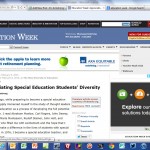 Today’s edition of Education Week, education’s news site of record, contains a Commentary piece that I wrote on the importance of valuing the strengths of students with special needs. In the article I write about my experience as a special education teacher almost forty years ago. I share the disillusionment I felt when I realized that special education was not going to be a place where I’d be developing students’ human potential , but rather where I was responsible for mystifying processes like ”auditory sequential memory” and ”sensory-motor skills” and the assessment of miniscule instructional objectives. I point out how things haven’t really changed much over the past forty years, and special education is still largely driven by a focus on students’ deficits, disorders, and dysfunctions.
Today’s edition of Education Week, education’s news site of record, contains a Commentary piece that I wrote on the importance of valuing the strengths of students with special needs. In the article I write about my experience as a special education teacher almost forty years ago. I share the disillusionment I felt when I realized that special education was not going to be a place where I’d be developing students’ human potential , but rather where I was responsible for mystifying processes like ”auditory sequential memory” and ”sensory-motor skills” and the assessment of miniscule instructional objectives. I point out how things haven’t really changed much over the past forty years, and special education is still largely driven by a focus on students’ deficits, disorders, and dysfunctions.
I suggest in the article that it’s time for a paradigm change, and that the concept of neurodiversity provides just what is needed as far as focusing on strengths and differences instead of disabilities. I point out how there is an emerging literature on the strengths of students with special needs, including Simon Baron-Cohen’s work on the systemizing abilities of people with autism, Katya von Karolyi’s work on the three-dimensional visualizing abilities of students with dyslexia, and Elizabeth Dykens’ studies on the personality attributes of people with intellectual disabilities, among other research.
Finally, I point out how recent developments in education reveal a movement toward a more strength-based approaches to special education, such as Colorado-based Jefferson County school district’s inauguration of an office of ”diversity and inclusion,” the appointment of Ari Ne’eman, a neurodiversity advocate, as a member of the National Council on Disability, and the inclusion of neurodiversity in Andrew Solmon’s latest best-selling critically acclaimed book Far from the Tree.
The article is based upon my recent book Neurodiversity in the Classroom: Strength-Based Strategies to Help Students with Special Needs Succeed in School and Life
This article was brought to you by Thomas Armstrong, Ph.D. and www.institute4learning.com.
Follow me on Twitter: @Dr_Armstrong


















